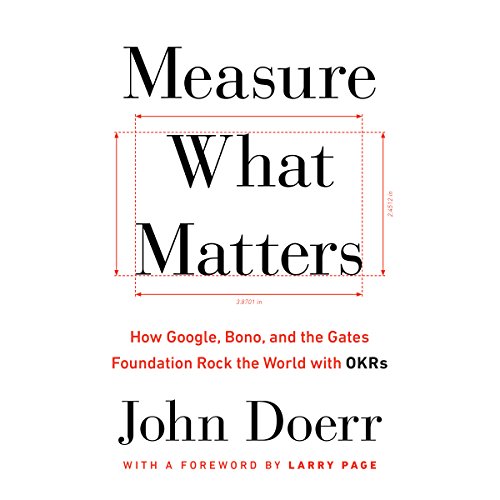
Legendary venture capitalist John Doerr reveals how the goal-setting system of Objectives and Key Results (OKRs) has helped tech giants from Intel to Google achieve explosive growth – and how it can help any organization thrive.
In the fall of 1999, John Doerr met with the founders of a start-up whom he’d just given $12.5 million, the biggest investment of his career. Larry Page and Sergey Brin had amazing technology, entrepreneurial energy, and sky-high ambitions, but no real business plan. For Google to change the world (or even to survive), Page and Brin had to learn how to make tough choices on priorities while keeping their team on track. They’d have to know when to pull the plug on losing propositions, to fail fast. And they needed timely, relevant data to track their progress – to measure what mattered.
Doerr taught them about a proven approach to operating excellence: Objectives and Key Results. He had first discovered OKRs in the 1970s as an engineer at Intel, where the legendary Andy Grove (“the greatest manager of his or any era”) drove the best-run company Doerr had ever seen. Later, as a venture capitalist, Doerr shared Grove’s brainchild with more than 50 companies. Wherever the process was faithfully practiced, it worked.
In this goal-setting system, objectives define what we seek to achieve; key results are how those top-priority goals will be attained with specific, measurable actions within a set time frame. Everyone’s goals, from entry level to CEO, are transparent to the entire organization.
The benefits are profound. OKRs surface an organization’s most important work. They focus effort and foster coordination. They keep employees on track. They link objectives across silos to unify and strengthen the entire company. Along the way, OKRs enhance workplace satisfaction and boost retention.
In Measure What Matters, Doerr shares a broad range of first-person, behind-the-scenes case studies, with narrators including Bono and Bill Gates, to demonstrate the focus, agility, and explosive growth that OKRs have spurred at so many great organizations. This book will help a new generation of leaders capture the same magic.
Read by John Doerr, William Davidow, Brett Kopf, Jini Kim, Mike Lee, Atticus Tysen, Patti Stonesifer, Susan Wojcicki, Cristos Goodrow, Julia Collins, Alex Garden, Joseph Suzuki, Andrew Cole, Bono, and others

My favorite book on business leadership As a long time management scholar (34 years in academia) I have to say that this is one of the best books on management I have ever read. A great deal of nonsense and hype has been written about organizational leadership. But Doerr gets right to the core issue–given that you have useful ideas, how do you actually get them implemented? He goes into enormous detail about the use of the OKR’s (Objectives and Key Results) which he introduced to Google. He gives numerous examples of how they should…
Excellent way to learn about a framework used by Andy Grove and Google. Specific examples and case studies are terrific! I couldnât put this book down, so I read it in one sitting.Many business books talk about the organizational brilliance of Andy Grove’s Intel, Google, disruptive startups, and high-performing charities. This one actively teaches you how to mimic their organizational brilliance. The book distinguishes itself by providing clear examples of how OKRs help organizations achieve their full potential. Primary source documents, including internal memos, show how Intel CEO Andy Grove used…
How OKRs can help you: from the man who is single-handedly responsible for bringing OKRs to Google. I’ve worked on the Google campus for 11 years, and have seen first-hand the impact OKRs have had on the company. John Doerr is single-handedly responsible for bringing OKRs to Google. He saw before anyone else the transformative power Andy Grove’s system from Intel could have at Google, and this book is a great window into those early days. John does a great job showing how that early presentation at Google set the stage for so much of the growth and success that came later.Some of…